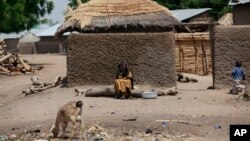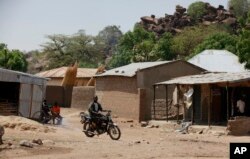Boko Haram fighters are overrunning villages near the northeast Nigerian town of Chibok, forcing hundreds of people to flee as they loot and burn in the area from which nearly 300 schoolgirls were kidnapped in 2014, local leaders said Tuesday.
“Chibok is now under Boko Haram siege,'' the chairman of the Chibok local government area, Yaga Yarkawa, told journalists Tuesday in Maiduguri, the birthplace of Nigeria's homegrown Islamic extremist group 130 kilometers (80 miles) to the northeast.
The accounts of Boko Haram violence around Chibok, along with multiple suicide bombings in Maiduguri city and attacks on army outposts in the area, raise doubts about claims by the military and government that the seven-year-old insurgency is nearly defeated. Instead, the insurgents have stepped up attacks as the rainy season ends, making them more mobile.
Scorched-earth tactics
Nine villages within 25 kilometers (16 miles) of Chibok town have been razed in the past two weeks, with the last attack at Thlaimaklama village at the weekend, said Yarkawa.
Boko Haram is employing scorched-earth tactics, rustling livestock, looting crops just ready to harvest, and burning homes and what crops they cannot carry, Yarkawa said. “Contrary to claims by government and security operatives, Chibok is not safe.”
It's not known if anyone has been killed, because people are too scared to go to the deserted villages, civilian self-defense fighter Bulama Abogu said. No soldiers have intervened, he said.
Many of the villages fringe on the Sambisa Forest, where Nigerian security forces have been carrying out near-daily air bombardments and ground attacks in which they have freed thousands of Boko Haram captives and cut food supplies.
Claim of victory disputed
The forest stronghold was where Boko Haram initially took 276 schoolgirls kidnapped from the government high school at Chibok on April 14, 2014. Nigeria's government last month secured the first negotiated release of 21 Chibok girls. Another Chibok girl escaped captivity in May and one was rescued in an army raid earlier this month. The government says it is conducting negotiations with Boko Haram for the freedom of nearly 200 Chibok girls who remain missing.
The chief of army staff, Lieutenant General Tukur Buratai, last week insisted that “the terrorists have been defeated” and the army is conducting “mop-up operations aimed at ensuring that we clear the rest of them.”
That is disputed by former Nigerian Vice President Atiku Abubakar, who said at the weekend that “the insurgents still occupy a specific geographical space. They still retain the capacity for occasional deadly attacks. Many citizens in the zone still remain vulnerable and live in fear.”












